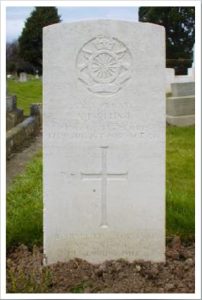Army Cyclist Corps

Albert Thomas Blunt was born on 31 July 1892, one of eleven children born to Thomas and Mary Ann Blunt, who lived in the Kingsholm district of Gloucester. Nine of these children were surviving at the time of the 1911 Census. Thomas Blunt died in late 1898, aged 47 and it appears likely that this was due to an infectious illness and his daughter Nora and son Raymond also died at this time.
Albert joined the Army Special Reserve, on a six year service engagement on 3 January 1910 at the age of 18; he described his occupation as a ‘sugar boiler’. He appears to have undergone training in the UK from his enlistment date until 5 July 1910, after which he joined the 2nd Battalion of the
Gloucestershire Regiment (allocated a service number of 9356), serving in the UK until 11 September 1913. He was posted with the battalion to Tiensin, China on 12 September 1913.
According to his Army Service papers, which,fortunately, have survived, he had a rather chequered disciplinary career, with numerous minor offences and punishments, during his pre-war service. However, his record also states that he was intelligent and hardworking in performance of his duties as an officer’s groom. Albert’s discipline improved greatly during Great War service, a 14 day Field Punishment No 2 for drunkenness on 24 June 1916 being the only blemish.
Following the outbreak of war the 2nd Glosters returned to the UK arriving at Southampton on 8 November 1914 and joined 81 Brigade, 27 Division at Winchester. The battalion was ordered to France on 19 December 1914, landing at Le Havre, where it stayed until 27 November 1915.
Albert must have obtained leave in early November as on 6 November 1915 he married Beatrice Ellen Mary Hannis, at St Mark’s Church, Kingsholm.
At some point, whilst in France, Albert transferred to the Divisional Cyclist Section, which became the Army Cyclist Corps and he was part of 16th Corps Cyclists.
He was allocated a new Army number 5704.
The 2nd Glosters left France for Salonika on 28 November 1915 and Albert, in his new role, was also posted there. His duties appear to have been as an officer’s servant.
Salonika was a notoriously unhealthy front on which to serve as much of the ground occupied by the opposing armies (an Anglo-French force faced the Bulgarians) was swampy and infested with mosquitoes: malaria was rife. Albert contracted the disease and was taken ill when returning to England on leave and was admitted to Kingston-upon-Thames Military Hospital on 13 August 1918: he transferred to Horton (County of London) War Hospital, Epsom on the following day but died as a result of acute lumber pneumonia at 9.55am on 17 August 1918. He was 26 years old.
Albert Blunt was buried in Gloucester Old Cemetery on 22 August 1918. His funeral was reported in the Gloucestershire Journal of 24 August and it stated that he was buried with full military honours, six of his comrades who returned with him on leave acting as bearers. A death notice which appeared in the same edition of the newspaper stated Albert’s address to be 84 Suffolk Street, Gloucester.
An elder brother, Ernest Sidney Blunt was killed in action while serving with the 1/5th Battalion, Gloucestershire Regiment in Italy aged 35. He is buried in Boscon British Cemetery.
Albert’s grave is now marked by a standard CWGC headstone, which bears the inscription: He shall live forever in my memory his loving wife. Beatrice Blunt was living at 90 Sweetbriar Street, Kingsholm, when she was awarded a pension of 13 shillings and 9 pence per week from 24 February 1919. She lived until 1977.
Researched by Graham Adams 6th June 2017
